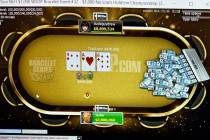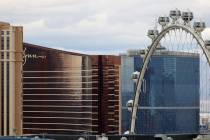LV Sands sued anew over license in Macau
For the second time in 14 months, officials from Las Vegas Sands Corp. will spend time inside a Clark County courtroom defending how the company earned a Macau gambling license in 2002.
In May 2008, a jury awarded Hong Kong businessman Richard Suen almost $60 million for his help in introducing Las Vegas Sands executives to Chinese government officials.
This time, an attorney for three men who claim they connected Las Vegas Sands with its eventual partner in the licensing process believes the company owes his clients at least $500 million.
"We're going to let the jury decide based on the evidence, and the evidence clearly shows what they were promised," Donald Campbell said during a hearing in front of District Judge Ken Cory, who will preside over the trial that starts June 1.
Clive Bassett Jones, Dax Turok and Cliff Cheong said they helped Las Vegas Sands win a shared Macau gaming license. They paired the company with Hong Kong-based Galaxy Entertainment. The move rescued a seemingly failed licensing bid.
In a deposition, former Sands executive David Friedman alluded to feeling suicidal over the company's apparent defeat in Macau. The partnership with a Taiwanese group was rejected and Friedman was out of options. The three men offered a new chance.
"At that point I didn't have a whole lot of rabbits left to pull out of the hat," Friedman said. "What they proposed was a good idea."
The case bears similarities to last year's trial. The casino operator was ordered to pay Suen $58.6 million. That verdict is on appeal to the Nevada Supreme Court.
Las Vegas Sands Chairman Sheldon Adelson and former company President Bill Weidner will be on the witness list. Both men testified in the Suen case. Weidner was forced to resign in March and his heated animosity with Adelson over the company's direction was publicly aired.
Jones, Turok and Cheong said they are owed 5 percent of the value of Las Vegas Sands' Macau gambling license, based on an agreement with company executives. In interviews, Adelson said the license was worth "billions."
The three men said they helped Las Vegas Sands formulate a business relationship with Galaxy, partly by arranging a meeting in Macau between officials from Galaxy, Las Vegas Sands and Macau Special Administrative Region Chief Executive Edmund Ho.
On Feb. 8, 2002, Las Vegas Sands and Galaxy were awarded a joint gaming concession. The companies eventually split the license.
Campbell said the case focuses on "quantum meruit," a legal term meaning "as much as he deserves."
If the jury agrees with Campbell's view, the figure could be a financial hit Las Vegas Sands can ill afford.
Howard Stutz's Inside Gaming column appears Sundays. E-mail him at hstutz@reviewjournal.com or call 702-477-3871. He blogs at lvrj.com/blogs/stutz.

















